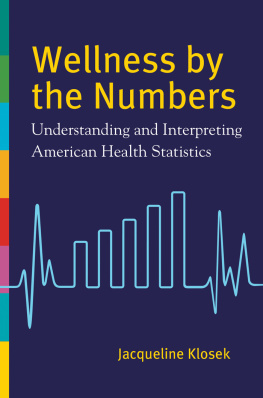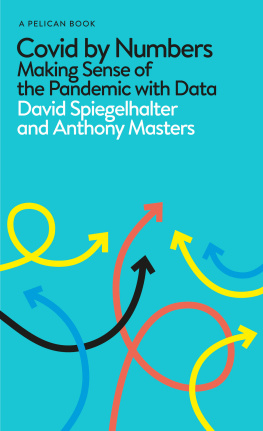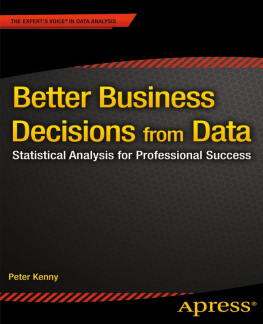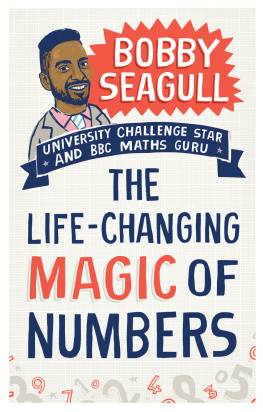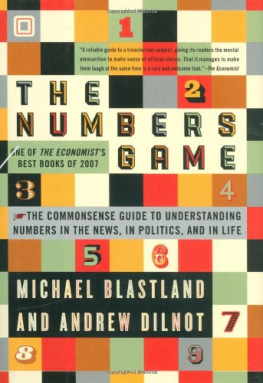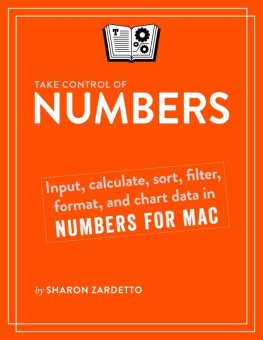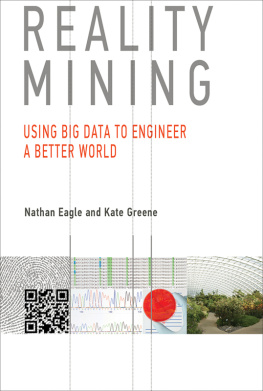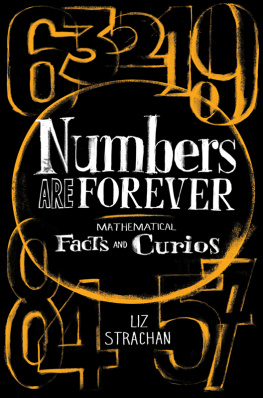Acknowledgements
Books have a funny way of coming to fruition. The experiences Ive had, the books and papers Ive read, the people Ive been lucky enough to work with and the people who support me all, in some way, shaped this little A5 book. Its never possible to mention everyone or everything that has contributed after all, much of it isnt tangible but I do know that Im grateful for all of it.
I am particularly grateful for my tribe of extraordinary humans: Tim, Tash, Jhye, Darcy, Carly, Catherine, Mel, Liane, Al, Dan, Anna and Nicola. Thank you just doesnt seem enough. JB, thanks for getting me out of my head (and house!) through the writing process and for reminding me to take life just that bit less seriously. #chickenfried
Thank you Lesley and Brooke for believing in the power of the numbers! You have both undoubtedly made this a better final product for the reader, so I also need to say thank you on their behalf.
To my TLBS tribe, particularly my writing quest groups and my BL Friday morning crew you are absolute legends and Im so glad we are on this journey together.
And finally, to the legends that I get to work with on an ongoing basis I love learning from you, working with you and being stretched by you. So much of this book has evolved because of you, and I am so grateful. Thank you.

About the author
Selena Fisk is a data storyteller who is passionate about helping others sort through the numbers to tell the real stories and lead positive change. She fiercely advocates for a world in which we are all data-informed, not data-driven; yet she realises that this isnt a skill set we all have or are confident in.
As a data coach and storyteller, Selena is as enthusiastic about building data storytelling skills in others as she is about building her own understanding of the evolving ways data can support individuals, organisations and communities to flourish and thrive. For Selena, using data in a way that benefits others is the only way to use it. Almost nothing will accelerate the impact we can have as humans like being able to see trends in the numbers, and using this information alongside our understanding of context to inform our decisions.
In her role as an independent data expert, Selena has mentored executive, senior and middle leaders as well as hundreds of others in data storytelling, positively impacting the organisations in which they work. With her background in teaching, she has developed resources to promote data storytelling in schools, including an online self-paced data storytelling course, and two books published by Hawker Brownlow Education and Solution Tree.

Chapter 1
Why data literacy?
But Im not a numbers person...
(said by too many people, all the time)
Data is everywhere. Smart watches track our blood oxygen levels. Google Maps predicts the best route to our appointment depending on the day and time that we get into our car. The DRS (umpire decision review system) confirms cricket wicket decisions from the snicko, heat map and ball trajectory estimates. Social media predicts who you might want to connect with and what you want to buy. No matter what industry you work in, or where you live, data is pervasive.
Because our workplaces and organisations are microcosms of broader society, the use and implication of data will continue to evolve and develop in the coming generations, and will keep increasing at an exponential rate. No longer will governments or investors support organisations that cant provide solid evidence of impact, with funding increasingly redirected elsewhere when departments or organisations do not perform.
We have better access to information about our own habits than ever before. My Apple Watch tells me how many days in the last week and month I hit my exercise, movement and standing goals, and my banking app on my phone sorts my spending into buckets so I can see how much I spent on eating out (too much), education (too much) and technology subscriptions (dont care worth it!).
In small business, numbers help us make decisions. When I floated the idea of this book with my publisher, I outlined my intended market and the aims of the book, and provided chapter summaries. Yet the first conversation we had started with the numbers: required investment costs, royalty rates, which comparable books have sold how many copies and so on. In the corporate world, success often depends on the numbers whether that be clients won, billable hours or on-time performance. But it isnt just the big performance indicators that matter; its the nitty gritty, smaller data points along the way that you must be able to read, unpack and question at the appropriate time.
In some ways, this makes sense. Why would my book publisher invest in editorial, design and marketing if the data shows that books on this topic dont sell? It would be a crazy decision, leading to money lost due to pursuing a project the data indicated was a poor choice. Why would investors continue to invest in organisations that are underperforming? Why would business owners persist if the data indicates the market and clients are not responding to their products or services?
However, using evidence to inform decision-making can be tricky particularly if you are new to business, dont have experience using or acting on data or dont have the tools and resources you need. Often, regardless of the size of your organisation, the issue isnt that you dont have the data its that you dont necessarily know what to do with it. In a 2018 Gartner survey of chief data officers views on roadblocks to success, poor data literacy was the second-highest-ranked roadblock, behind culture challenges to accept change, and just ahead of lack of relevant skills or staff.
One of the reasons many people struggle to effectively put data to work is the time it takes from collecting the data to acting on it. Some industry research indicates that, in working with data, approximately 80 per cent of the time is taken up collecting and organising the data to ensure it is in a format that is useable, meaning that only 20 per cent of the time is spent on putting the data to work (Jones & Pickett, 2019). Even though the final 20 percent of effort is the most important, and is the part that will have an impact, often people tire or stop once the organisation or visualisation of the data is done. Sometimes, the organisation process takes so long that people have run out of steam, become distracted by the next challenge or been pulled away to focus on fixing another problem, so they dont get to the final part actually using the data. At home and in the workplace, we need to focus on putting the data were collecting and organising to work. We need to spend more time considering the ways evidence can be used to support our decision-making. As leaders, we also need to actively minimise the 80 per cent whether that be through technical solutions or automating the process as much as possible so we can get our best people working on the 20 per cent, but also increase that proportion to focus on solutions.
Data-informed versus data-driven
When talking about the ways in which data can be used, there is an important distinction to be made between being data-informed (which is what we want to be) and being data-driven (what we do not want to be). Being data-driven is like a horse wearing blinkers in a horse race they can see the finish line and the goal, but they cant see what is going on either side of them. They race towards the finish line, with minimal distractions, and a limited understanding of what other horses and riders are doing. Data-driven organisations are ruthless around the numbers. They move staff on if they dont meet targets; they change their product lines to increase market share; and they callously make all the big decisions based on what the numbers suggest will work. I do not believe that organisations should aspire to be data-driven, because despite the fact that I am a numbers person, the data (particularly if youre relying on one piece of quantitative data) can never tell you the whole picture.
Next page

